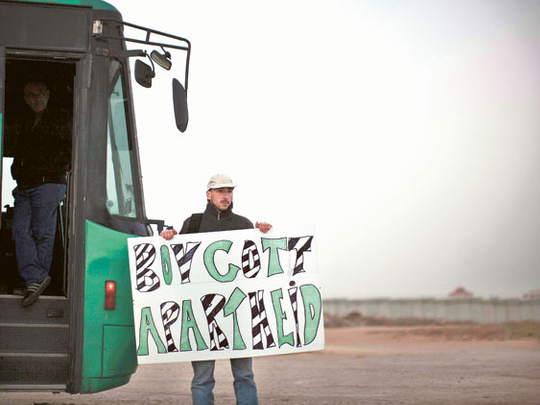
Ramallah: The Palestinian leadership is not ready to join a campaign to boycott all Israeli products despite wide participation in the "Bader" campaign — a homegrown movement to boycott products of Israeli colonies.
Speaking to Gulf News, Essam Al Qasem, general coordinator of the Palestinian national campaign to boycott products of Israeli colonies, said an endorsement by the Palestinian Authority would nullify all previously signed agreements with Israel. "We have to differentiate between the products manufactured in the Israeli colonies and those manufactured inside Israel," he said.
"An economic collapse in the Palestinian Territories will be followed by a security collapse," Al Qasem said. "Israel and the US are aware of this and are working hard to avoid it," he added.
However, Palestinians participating in the Bader campaign do not have effective mechanisms to make the boycott 100 per cent successful, according to Al Qasem.
The Bader campaign was initiated by the Palestinian National Initiative under the theme of ‘We want the occupier to lose'.
Non-violent resistance
Dr Mustafa Al Barghouti, Secretary General of the Palestinian National Initiative, told Gulf News that it was the right time for the Bader campaign that seeks to inflict the biggest possible losses on the Israeli occupation. "We are calling for a nationwide and comprehensive boycott campaign against all Israeli products, not only the products made in the Israeli colonies," he said. "The Bader campaign is an initial episode in the chain of the Palestinian public's non-violent resistance which should be activated in a way that leads to an international campaign to boycott Israel and impose sanctions on the occupation," he said.
The Bader campaign has published a list of Israeli products and distributed them among Palestinian traders. The idea is to pressure Israel which exports $3 billion (Dh11.01 billion) worth of products to the Palestinian Territories to adhere to peace negotiations. "It is not logical for the Palestinians to pay the bill of the Israeli occupation. It is not logical either for Palestine to be the second biggest market for Israeli products," Mazen Al Ezzah, a member of the campaign's central committee and coordinator of campaign in Bethlehem and southern areas of the West Bank, told Gulf News.
He said that the boycott campaign was the outcome of a detailed study of Palestinian consumption of Israeli products. "It is one of the effective tools of public resistance against Israel, and we will use it just the right way," he said. The Israeli occupation has started a counter attack on the campaign, fearing that the boycott will cover the entire Palestinian street, which will be catastrophic to Israel.
Investments
"Some of the greedy Palestinian traders who import Israeli products into Palestine are also waging a war against the campaign," he said. "They feel and fear the danger of the campaign which jeopardises their investments," he added. "The Palestinian public should be in control of what Israeli products are bought by Palestinians," he said.
"So far there are no statistics on the damage on the Israeli economy. We will however assess the damage and evaluate the initial results of the campaign on the ground," he said. The Bader Campaign has begun by targeting a juice and soft drink company, Tapuzina.












